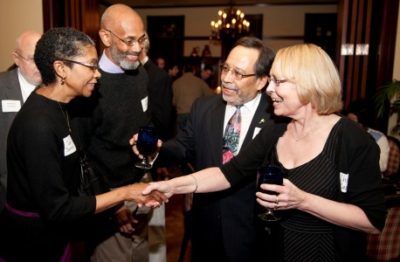Director Miguel Carranza, Ph.D., encourages students from all fields to sign up
UMKC recently introduced Miguel A. Carranza, Ph.D., as director of the College of Arts and Sciences’ new Latina(o)/Chicana(o) Studies program. The Latina(o)/Chicana(o) Studies program is an interdisciplinary program, and scholars from all fields are encouraged to participate.
The first course — Introduction to Latina(o)/Chicana(o) Studies — will be offered in the summer and fall of 2012. Within five years, after developing a certificate program and a minor, Carranza hopes to offer a major in Latina(o)/Chicana(o) Studies. To receive program updates, send an email to masonsal@umkc.edu with the subject line “Latina(o)/Chicana(o) Studies program”.
“UMKC is committed to ensuring that Latina(o)/Chicana(o) Studies is a respected and valued part of our academic curriculum and intellectual community,” said UMKC Executive Vice Chancellor and Provost Gail Hackett, Ph.D. “As a widely-recognized leader and innovative educator, Dr. Carranza possesses the vision and expertise to lead the University to the next level in expanding the university life and learning opportunities for our diverse campus community.”

UMKC Trustee John Readey, UMKC Chancellor Leo Morton, College of Arts and Sciences’ Interim Dean Wayne Vaught and Carlos Salazar, chair of the UMKC Hispanic Advisory Board, welcome Miguel Carranza, director of UMKC’s new Latina(o)/Chicana(o) Studies program.
Carranza previously served as professor of Sociology and Ethnic Studies in the College of Arts and Sciences at the University of Nebraska-Lincoln (UNL). His research has centered on the fields of Chicano, Latino and Mexican-American Studies and Ethnic Studies, with a focus on Latino children, mentoring, Midwestern Chicano/Latino communities, immigration and language attitudes.
Carranza received a Ph.D. (1977) and M.A. (1974) in Sociology from the University of Notre Dame. He received a B.A. in Education (1971) from Kearney State College (now the University of Nebraska at Kearney). He and his spouse, Christine Thiesfeld-Carranza, have two adult children, Alicia and Antonio.
Quick Five: Miguel Carranza, director of the College of Arts and Sciences’ Latina(o)/Chicana(o) Studies program
1. How did you become interested in Latina(o)/Chicana(o) Studies?
My parents were always proud of their Mexican nationality and that reinforced a positive identity in me. Yet, I noticed there were differences in how people interacted with others who were seen as being from another group.
In college, I became interested in finding out more about racial and ethnic groups. I learned that Julian Samora, the first Mexican-American to earn a doctorate in Sociology in the U.S., was teaching at the University of Notre Dame. He also was writing about Mexican-Americans in the Midwest (a region where I grew up), and I decided to study under his direction at Notre Dame.
2. What influenced your decision to come to UMKC?
I was struck by the fact that UMKC was committed to beginning a new program in Latina(o)/Chicana(o) Studies at a time when many universities and colleges are looking to make cuts. I also was impressed by the sincere interest and genuine support of Latinos in the greater Kansas City community who want to help make the program a success.
3. How can the Latina(o)/Chicana(o) Studies Program help students regardless of their majors and career paths?
Latina(o)/Chicana(o) Studies is a program that can educate Latinos and non-Latinos about the largest ethnic and racial group in the U.S. The Latino population continues to grow faster than any other population, and it is becoming even more diverse. As Latinos and their culture become an integral part of the U.S. workforce, college graduates will benefit from knowing as much as possible about the Latino population.
4. Who were your most influential mentors, and how have they affected your career path?
Julian Samora was my most influential formal mentor, as he was a trailblazer back when there were no other Mexican-American university faculty to help guide him to learn the ins and outs of graduate school. The success many of us Latina/o faculty have today is possible because of groundbreaking mentors, such as Julian Samora.
My most influential informal mentors were my parents, Atanacio and Josephine Carranza, although I did not recognize it until I went to graduate school. Through their everyday lives, they gave me the values and foundation to be proud of myself and the resiliency to attempt many things.
5. What are your goals for the Latina(o)/Chicana(o) Studies Program?
My goals for the Latina(o)/Chicana(o) Studies program are to establish an academic curriculum that the university can support and present as integral to UMKC’s mission. All students can benefit from furthering their understanding of Latinos, and the Latino community can advocate and take pride in this program.

